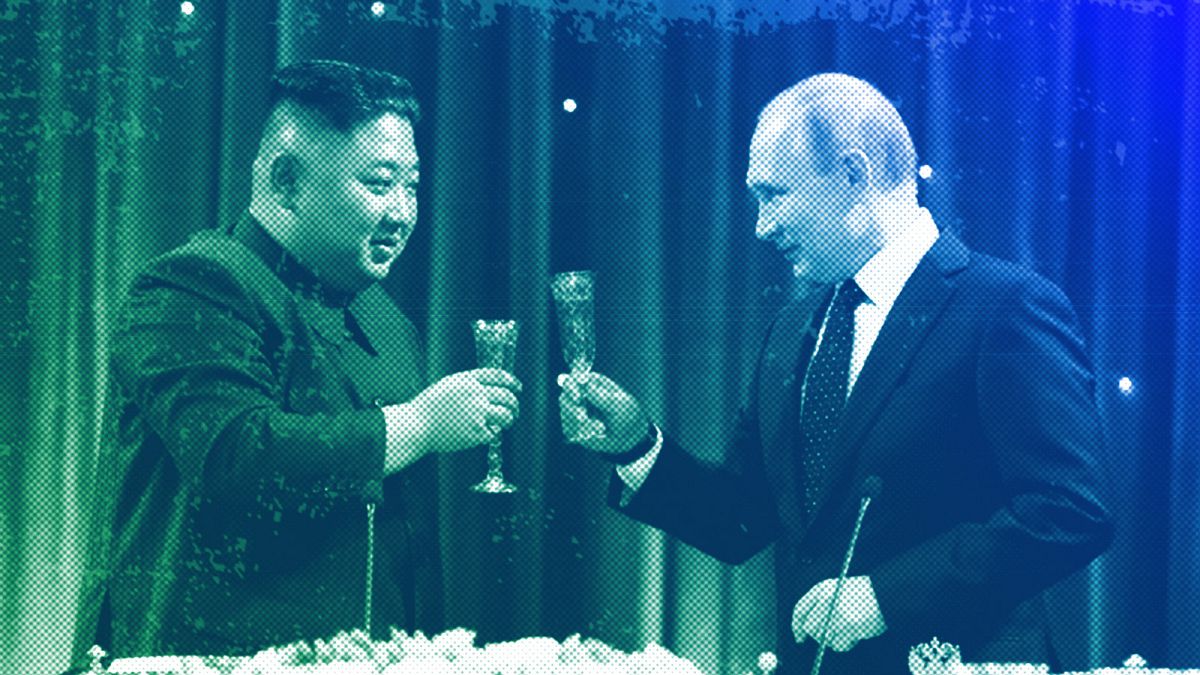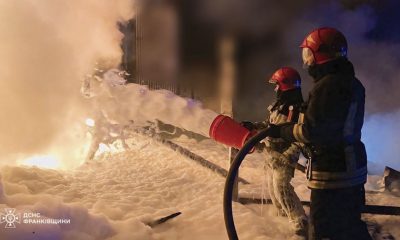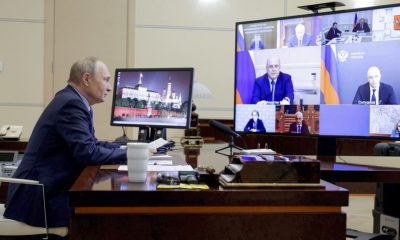General News
Dictatorships have never been closer — it’s time for democracies to do the same

The opinions expressed in this article are those of the author and do not represent in any way the editorial position of Euronews.
A shift in policy towards authoritarian countries, primarily regarding China and Central Asian nations, must be accompanied by a change in the sanctions approach towards Russia and its allies, Carine Kanimba and Natalia Pelevina write.
After the “election” of Vladimir Putin for yet another presidential term last month, the list of those who lined up to congratulate the Russian dictator made for intriguing reading.
Belarus’ Lukashenka said support for Putin was “overwhelming”; Azerbaijan’s Aliyev offered his warm regards on the occasion of Putin’s claimed 87,28% of the “vote” – whilst just last month Aliyev received congratulations from Putin for his 92% victory.
Kim Jong Un said he would “firmly join hands” with his neighbour to the west. Iran was, of course, keen to congratulate the former KGB man.
An anti-ideology links these countries — anti-democracy, anti-human rights, anti-justice. They increasingly work together in unison, strengthening their economic and political collaboration, while democratic powers hesitate and retreat.
China and Iran keep passing Moscow the ammo
Russia’s official military spending in 2024 will amount to no less than €117.5 billion. Ukraine’s military expenditure in 2024 will be at least three times less, amounting to approximately €39bn.
For now, the confirmed financial and military aid from the West to Ukraine is dramatically less than what is needed.
Meanwhile, China is supplying Russia with military and dual-use goods, as well as providing significant economic assistance, increasing the volume of trade.
In 2023, the trade turnover between Russia and China amounted to €225.8bn, compared to €178.7bn in 2022 and €138.1bn in 2021.
Russia and other countries of the Eurasian Economic Union (EAEU) — Armenia, Belarus, Kazakhstan, and Kyrgyzstan — are all deepening relations with Iran. In December 2023, the EAEU countries signed a comprehensive free-trade agreement with the Islamic Republic.
Duty-free trade will cover a wide range of goods, including industrial products (machinery, aircraft and shipbuilding, equipment manufacturing, and much more). Russia controls the airspace of the Collective Security Treaty Organization (CSTO) countries, which include Russia, Belarus, Kazakhstan, Kyrgyzstan, and Tajikistan.
Attempts by Western powers to keep Central Asian nations onside by staying silent on human rights have clearly failed miserably.
Abuse of political prisoners has never been worse
Human rights in the region are rapidly deteriorating. In Belarus, the abuse of political prisoners has reached a critical point, with thousands enduring beatings, systematic denial of medical care, and isolation from the outside world.
Opposition figures such as Mikalai Statkevich have been forcibly disappeared for over a year. Since 2021, five political prisoners — Vitold Ashurak, Mikalai Klimovich, Ales Pushkin, Vadzim Khrasko, and Ihar Lednik have died in prison, effectively assassinated in the manner of Alexei Navalny.
At the start of 2023, Azerbaijan had 98 political prisoners. By the end of the year, this number neared 300. The crackdown on civil society and activists began with the case of human rights defender and academic Dr Gubad Ibadoghlu, jailed for criticising the government’s role in channelling Russian fossil fuels to the West.
With grim irony, Baku is set to host COP29 later this year, taking the lead on the world’s climate policy, whilst some Western leaders go as far as to attack core democratic institutions that uphold international law for short-termist electoral reasons.
And in Russia, Putin’s regime continues to outdo itself in cruelty and madness. Vladimir Putin is undoubtedly responsible for the murder of Alexei Navalny.
As with many politically motivated crimes in contemporary Russia, no one will be held accountable until Putin’s regime ends. There are nearly a thousand political prisoners in Russia, whose lives hang in the balance.
Putin’s firmer grip on power will help other authoritarians
The tragic insufficiency of financial and military support from the West for Ukraine could culminate in Putin’s victory, a result that promises catastrophic repercussions for every nation within the former Soviet Union.
And Putin’s regime has gone to great lengths to ensure that this happens, going as far as bribing EU lawmakers in order to block a cohesive Western front against them from emerging. But the time for unity in the face of authoritarianism and corruption is now.
With the resulting strengthening of Putin’s regime, the authoritarian regimes in Belarus, Kazakhstan, Azerbaijan, and Tajikistan will solidify, and civil society in these countries will lose any opportunity for any democratic transformation for many decades.
At a meeting of the World Liberty Congress in Washington DC in March, dozens of democracy activists from around the world gathered to lay out their plans to defeat dictatorship.
Asked by one reporter what the US could do for them, WLC president Masih Alinejad replied: “We’re not asking the American government, Washington, DC, European governments to save us. We want them to stop saving our oppressors.”
Democracies must change their stance on authoritarian states
Democratic governments need to amplify and extend financial and military support to Ukraine. And Western countries must change their policy towards authoritarian states.
A shift in policy towards authoritarian countries, primarily regarding China and Central Asian nations, must be accompanied by a change in the sanctions approach towards Russia and its allies.
Instead of introducing new packages of ineffective sanctions, it is necessary to tighten existing sanctions aimed at reducing Moscow’s military potential.
Most importantly and urgently, democratic governments must — as a united front — reassess their strategies and substantially increase financial and military support for Ukraine.
This support is paramount in effectively confronting and overcoming the threats that could shape our world for decades to come.
Carine Kanimba is spokesperson, and Natalia Pelevina is the Regional Secretary for Eastern Europe and Central Asia for the World Liberty Congress (WLC).
At Euronews, we believe all views matter. Contact us at view@euronews.com to send pitches or submissions and be part of the conversation.
Source
Disclaimer: No copyright infringement intended. All rights and credits reserved to respective owner(s).
























